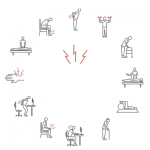Dr. Greer also recommends certain antidepressant medications, which “are used commonly for off-label chronic pain indications. Duloxetine, in particular, has indications approved by the FDA for chronic osteoarthritis pain and chronic fibromyalgia pain, along with the indication for depression and anxiety,” he notes.
Dr. Weselman says that, generally speaking acetaminophen and non-steroidal anti-inflammatory drugs (NSAIDs) are a good start. For neuropathic pain, other types of medicine may be more appropriate, such as gabapentin, Lyrica and amitriptyline.
“Inflammatory pain is going to respond better to anti-inflammatories and acetaminophen,” she adds. “Muscular pain is going to respond better to, perhaps, muscle relaxers. There’s a whole host of medications [that are not opioids] we can use to treat various types of pain. I think it’s important that we have that discussion with the patient, because I think patients think of pain medicine as being opioids, and if they don’t get an opioid, their pain isn’t being addressed.”
Dr. Weselman says the use of herbal supplements is a relatively unclear area, because not enough clinical evidence exists to support their efficacy. Dr. Greer says it’s a similar conundrum with medical marijuana, which may help alleviate pain in some patients, but needs additional study.
Challenges
Both rheumatologists agree there are times when the use of opioids is justified and necessary. But those situations are the doctor’s call—not the patient’s. One part of successfully using alternatives to opioids is ensuring patients feel their pain is being addressed.
In recent years, that’s been a trickier situation, because patients who use medical websites often feel they have a practical degree in pain management before a rheumatologist has spoken with them.
Dr. Google is always a problem, Dr. Greer notes. “Often, we have to do some myth debunking and spend a great deal of effort counseling the patient,” he says. “When it comes to chronic pain management, rheumatologists have an obligation to discuss with the patient that whatever treatment we give is designed to try to reduce their pain to a manageable level—but not eliminate pain entirely. I don’t think it’s realistic or appropriate to say we can get rid of all of your pain if it’s chronic.”
Dr. Greer, whose goal is to have patients report their pain level as 5 or lower on a 10-point scale, says it can be difficult when a patient he does not believe opioids are appropriate or has already been prescribed opioids by other rheumatologists—particularly patients diagnosed with fibromyalgia.


